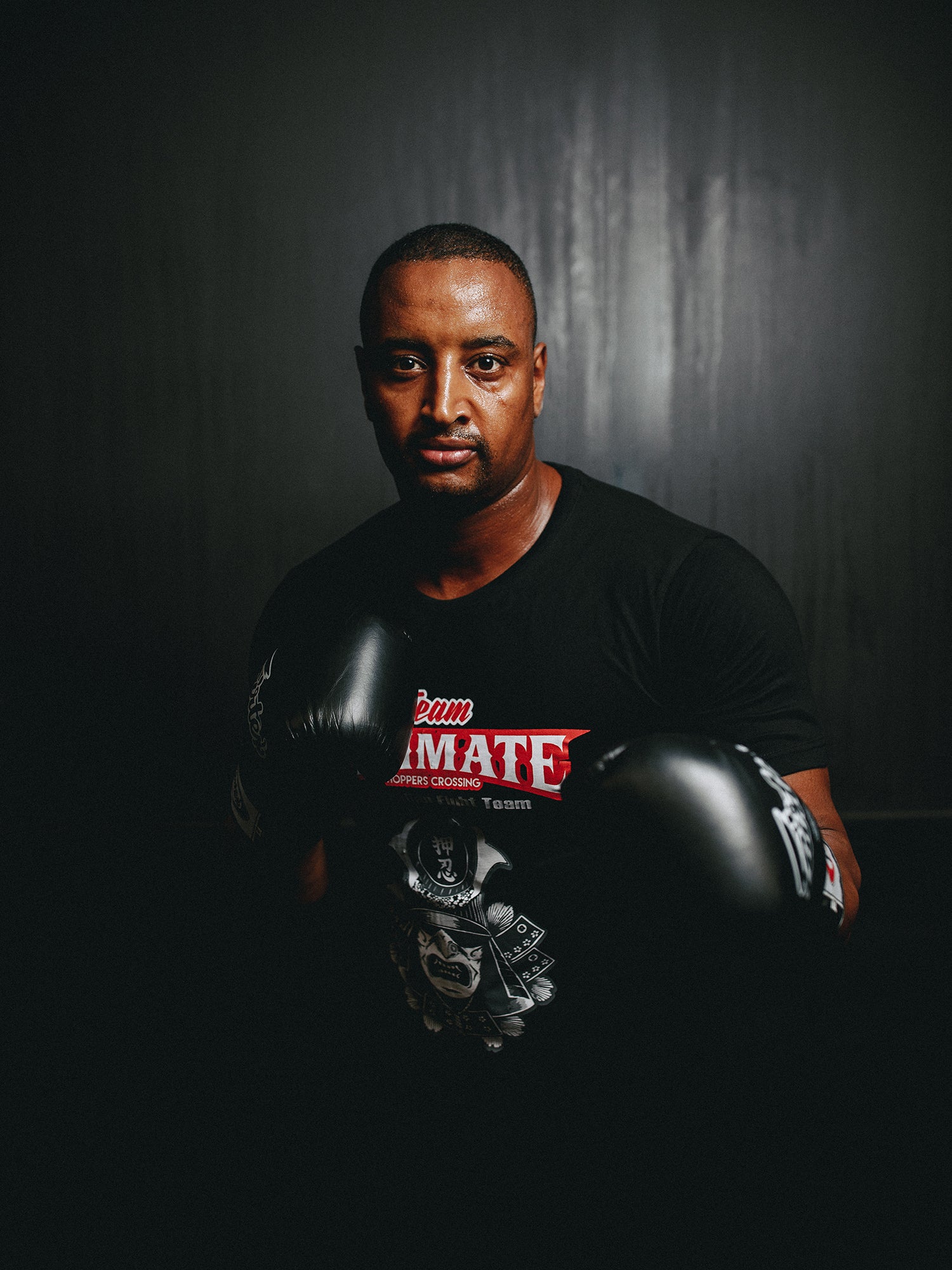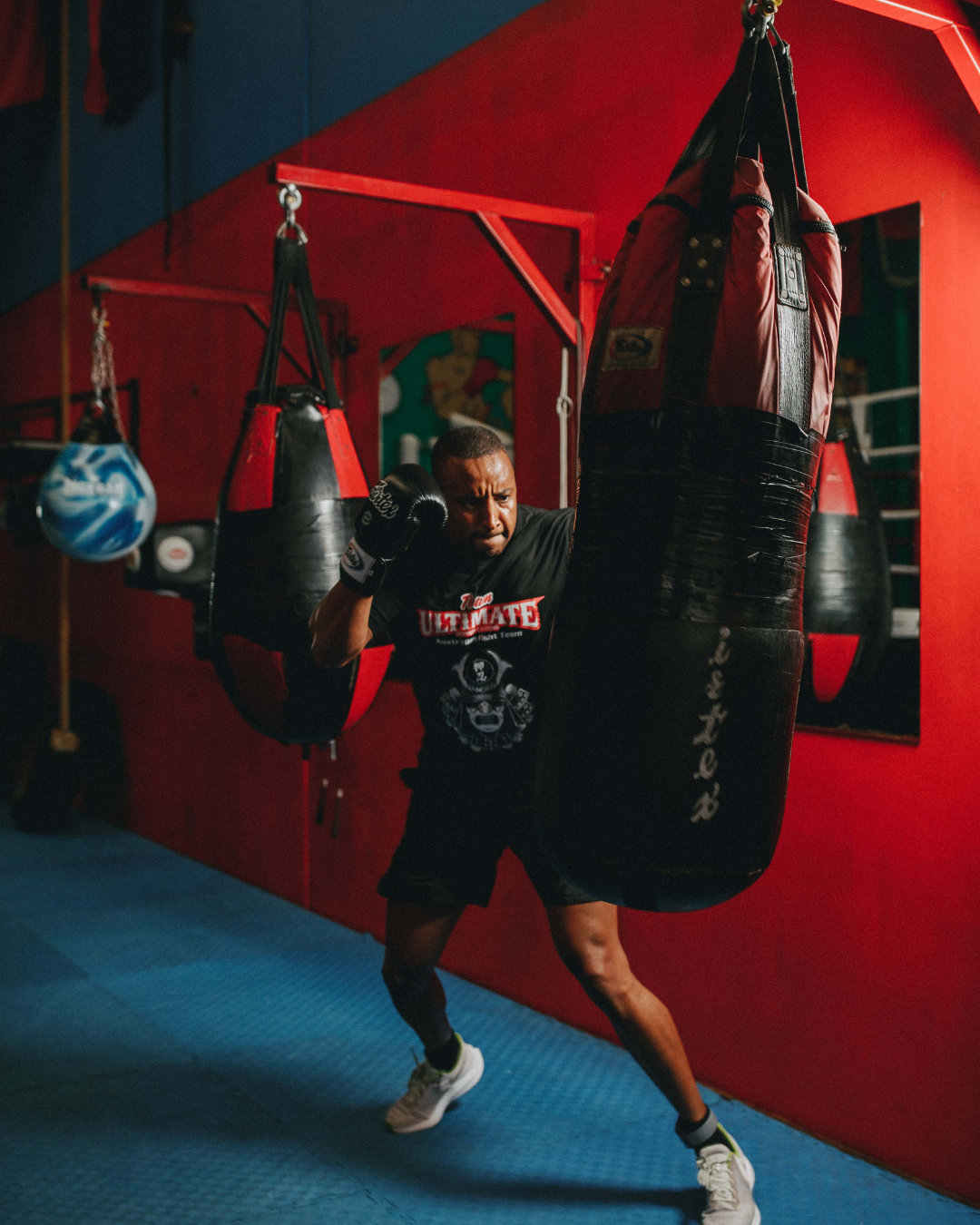TOHM: Khalid Baker
In the Dandenong boxing gym, Khalid Baker methodically circles the heavy bag snapping out crisp jabs and straight rights that echo through the room with a steady thwap-thwap. His ebony frame gleams with sweat as he feints and weaves, hurling left hooks and upper-cuts with concussive force.

TOHM: Khalid Baker
That Khalid moves like the real deal shouldn’t be surprising. The Melbourne boxer was once a genuine contender and is determined to become one again. As an 18-year-old in 2005, Khalid was the National Amateur Welterweight Champion and poised to represent Australia in the Commonwealth Games. That was until he wound up in jail for a murder that he didn’t commit.
To understand how an innocent man came to spend 13 years in jail boils down to a mix of extreme bad luck and a baffling web of legal techicalities. Or what Michelle Ruyters, Associate Professor of criminology and justice at RMIT, describes as a “gross miscarriage of justice”.
Essentially, what happened was this. In November 2005, Khalid was at a Brunswick warehouse party, when a fight broke out. In the resulting mass brawl, Khalid’s friend (who can only be identified as LM for legal reasons) pushed a man who stumbled backwards to fall through a first-floor window. Tragically, he died from his injuries in hospital a few days later.
Despite LM freely admitting to police that he’d pushed the victim, Khalid was put on trial for murder. Unbelievably, he wasn’t allowed to use his friend’s confession because of the “hearsay” rule that prevents statements made out-of-court being used in trials to prove facts asserted in those statements.
Khalid was eventually jailed for 17 years. Released after serving 13 of them in September 2018, the 32-year-old is now desperate to make up for lost time. Hell-bent on pursuing his ambitions in the ring, Khalid recently won the Victorian Cruiserweight belt and is now targeting bigger titles.
Having been robbed of his youth and sporting dreams you’d expect to find a hard-faced cynic who’s been eaten alive by bitterness. But in person, as he warms down in the gym, Khalid is disarmingly positive. Straight-backed with an easy grin, he carries himself with an affable civility that the brutal grind of prison life somehow failed to erode. Here Khalid explains how, after being plunged into a living nightmare, he found the mental wherewithal to embrace the chaos and keep smiling.

When I heard the sentence I felt like the whole world just stopped in that moment. I couldn't hear nothing. I said to the judge, ‘But I'm innocent! How am I found guilty for something I didn't do?”
I was sentenced to 17 years. I was thinking that cars were going to be flying by the time I get out.
Leaving the Supreme Court I was put on a bus to prison sitting next to this old guy who’d spent his whole life in and out of jail. “I heard you were found guilty - I'm so sorry for you,” he said to me. “But let me give you some advice: the best way to get through a long sentence is to get on the drugs. That way your time will fly by.”
“Thanks but I’m be alright,” I said to him. “I'll get through it the way I get through it.”
Prison is like a jungle. People try to pick on the weak. If you take a backward step for one person, you’ll have to take a backward step for every person. If someone comes at you, then you need to just go toe-to-toe.
You meet a lot of bad people in prison and I was still just a young guy. I remember a couple of weeks in these two guys walking into my cell trying to steal my Nikes. They ended up walking out with two black eyes.
I was angry at the police, I was angry that the justice system could let you down. To me it was like they were hiding behind some loophole - an innocent man serving time while the person who admitted to it was going home. How does that work out?
So I was angry at everyone. But I also knew that mindset wasn't going to get me anywhere. The tension was making me clench down on my jaw and it started to hurt so much. I knew that attitude wasn't healthy for me.
I began to realise it's all about how you control that emotion. Do you let that emotion get the better of you or can you get the better of it? So halfway through my sentence, I realised I couldn't be angry anymore. My mum had ended up getting cancer and I didn't want her to see me as this angry person. If she left this world, I wanted her to know her son was happy.
What I did was this: I stopped thinking about what I didn't have, and I focused on what I did have in my life. I focused on what I could still be grateful for. I still had my health. I still had my family. And I thought, you know what, I'm still alive, I can still do a lot of things.
I made the choice of changing my behaviour. I made the choice to be grateful and just to smile every single day. That was the biggest change in my life. I had to forgive, I don't have to forget, but when I forgave then in my heart I let go of all that bitterness.
Instead I started thinking about what I was going to do when I got out. Number 1: I was going to prove to the world that I never committed that crime. Number two, I wanted to win a world title. That's still my dream right now.
In prison, I kept training and training. I used to say myself: “Guys on the outside are partying, not sleeping well, not eating well, not living a good life…. If I can keep strong in here, by the time I hit the outside world, I'll destroy anyone who's in front of me. I’ll be ready to pounce.
In prison I trained three times a day. There was a heavy bag and I had a skipping rope. We used to make pads out of toilet paper and rolled-up socks. Prayer and training - that was all I did.
Every night, when I used to go to bed. I’d lie in bed and look at the ceiling, and picture myself in the ring. I’d imagine the song that I’d come out to, the little dance that I’d do. I’d hear the crowd and the sound of the bell. Then I’d picture the whole fight and see myself copping the punches, ducking and weaving. I used to imagine an entire fight in my head every single night.
And I used to pray to God for that opportunity to get back in the ring. I vowed that if I got it, I wouldn’t let that opportunity go.
I said to myself: Your time will come. Your time will come. You will come out. Your name will be cleared, and you're going to do what you always loved doing.
Now I feel that the only person who's going to make me fail is myself. No one else. Because you only lose to your own mindset. The biggest fight is the mind - if you can win that you can beat anyone in the world.
Look, sometimes I do think what could’ve happened if I’d gone to the Commonwealth Games. But on the switch side of it, I wonder if I’d have been this determined now. Would I have been this hungry?
I lost many years of my youth in prison. But in other ways they also gave me a lot back. Prison taught me how precious life is and to appreciate the things that you actually have. Don't waste your life, just cherish it. Now in the ring, I honestly cherish every moment. Sometimes when you get hit in the head you think do I really want this? But I know this is what I worked for. This is what I want.
Prison taught me you can't change what happened. What's happened yesterday is gone. But what you can change is what you do today and tomorrow. You can change how you live your life going forward.


